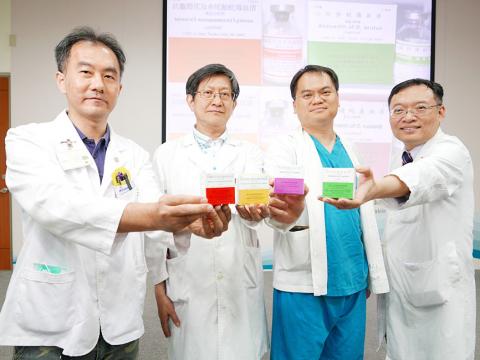People must not provoke or attack snakes in the wild and should refrain from using “midwives’ cures,” but seek medical attention as soon as possible if bitten, doctors said.
Mao Yen-chiao (毛彥喬), a doctor at Veterans General Hospital Taichung branch’s department of toxicology said that the hospital in June last year treated a 50-year-old farmer who said he was bitten by a cobra.
The man killed the snake, took it home and ate it with a herbal liquor in a bid to counteract the venom, Mao said.

Photo: Tsai Shu-yuan, Taipei Times
However, the alcohol helped the venom spread and 10 hours later he was at the hospital with a swollen left foot and complaining of unbearable pain, Mao said, adding that he was diagnosed with sepsis and necrotizing fasciitis, a bacterial infection that can swiftly destroy skin, fat and the tissue covering muscles.
The man was delirious and had a fever when he was admitted and it took six debridements to clean the wound, department of plastic surgery doctor Lai Chih-ming (賴志明) said.
Blood tests showed that the man was infected with Morganella morganii, a rare event, department of infectious diseases doctors Shih Chih-yuan (施志源) and Liu Po-yu (劉伯瑜) said.
Although the man recovered, cirrhosis had complicated his treatment and delayed his discharge from the hospital by two months, they said.
In a separate case, the hospital treated a patient bitten by a mountain pit viper — Ovophis monticola makazayazaya — administering antivenom intended for people bitten by a pointed-scale pit viper, or Protobothrops mucrosquamatus.
The antivenom had been ascertained as an antitoxin for mountain pit viper venom, doctors said.
When in the wild or crossing territory known to have snakes, people should use a stick to probe long grass, which scares snakes away, Mao said, adding that if bitten, the snake should not be chased.
However, it is important to identify the snake, so its characteristics should be noted or a photograph taken to help doctors administer an appropriate antivenom, he said.

Taiwanese can file complaints with the Tourism Administration to report travel agencies if their activities caused termination of a person’s citizenship, Mainland Affairs Council Minister Chiu Chui-cheng (邱垂正) said yesterday, after a podcaster highlighted a case in which a person’s citizenship was canceled for receiving a single-use Chinese passport to enter Russia. The council is aware of incidents in which people who signed up through Chinese travel agencies for tours of Russia were told they could obtain Russian visas and fast-track border clearance, Chiu told reporters on the sidelines of an event in Taipei. However, the travel agencies actually applied

Japanese footwear brand Onitsuka Tiger today issued a public apology and said it has suspended an employee amid allegations that the staff member discriminated against a Vietnamese customer at its Taipei 101 store. Posting on the social media platform Threads yesterday, a user said that an employee at the store said that “those shoes are very expensive” when her friend, who is a migrant worker from Vietnam, asked for assistance. The employee then ignored her until she asked again, to which she replied: "We don't have a size 37." The post had amassed nearly 26,000 likes and 916 comments as of this

New measures aimed at making Taiwan more attractive to foreign professionals came into effect this month, the National Development Council said yesterday. Among the changes, international students at Taiwanese universities would be able to work in Taiwan without a work permit in the two years after they graduate, explainer materials provided by the council said. In addition, foreign nationals who graduated from one of the world’s top 200 universities within the past five years can also apply for a two-year open work permit. Previously, those graduates would have needed to apply for a work permit using point-based criteria or have a Taiwanese company

The Shilin District Prosecutors’ Office yesterday indicted two Taiwanese and issued a wanted notice for Pete Liu (劉作虎), founder of Shenzhen-based smartphone manufacturer OnePlus Technology Co (萬普拉斯科技), for allegedly contravening the Act Governing Relations Between the People of the Taiwan Area and the Mainland Area (臺灣地區與大陸地區人民關係條例) by poaching 70 engineers in Taiwan. Liu allegedly traveled to Taiwan at the end of 2014 and met with a Taiwanese man surnamed Lin (林) to discuss establishing a mobile software research and development (R&D) team in Taiwan, prosecutors said. Without approval from the government, Lin, following Liu’s instructions, recruited more than 70 software